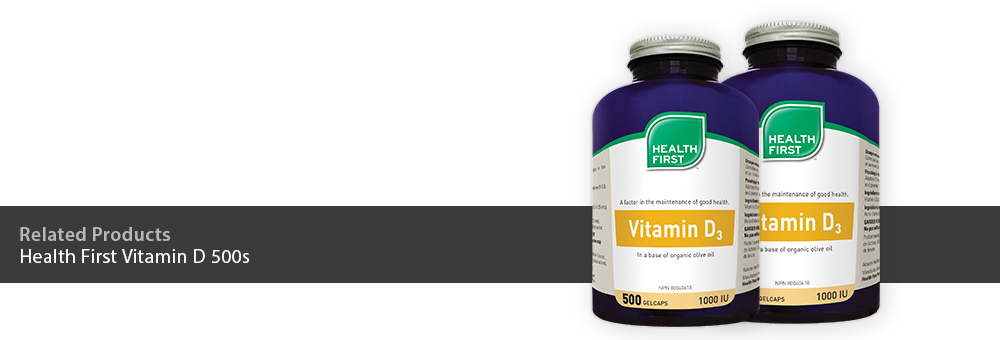

Canadians and Low Vitamin D Levels
Vitamin D is a vital nutrient. We generally get the Vitamin D we need from the sun’s rays, which give Vitamin D its nickname as the “Sunshine Vitamin.” Unfortunately, two major issues prevent most Canadians from getting sufficient amounts of Vitamin D. First, modern concerns about the harmful effects of sun exposure mean that Canadians tend to limit their time in the sun. Second, Canada is a northern country with very limited amounts of sunshine during winter months. Health experts believe as many as 80% of Canadians do not get enough Vitamin D during the winter months from October to March.1 Quoted in the Globe & Mail, Dr. Rohan Gunasingham stated, “Starting from now [October], if you are in Toronto, you can forget it. You will not make any vitamin D even if you go and stand outside without any clothes.”2
Insufficient Vitamin D intake is associated with major diseases
How then, do we ensure that we get sufficient amounts of this vitamin? Studies show that supplementation of Vitamin D, specifically D3, is an effective way to obtain Vitamin D3 . The costs of not getting enough Vitamin D are great.
Low levels of Vitamin D are associated with:
• Over a dozen different types of cancer, including breast, prostate, colon, pancreatic, ovarian and bowel cancers.4
• Low bone density and poor calcium absorption.12
• Low energy and depressed mood from SAD (Seasonal Affective Disorder) during winter months.1,14
• Congestive heart failure.9
• Backaches, muscle pain and painful joint inflammation, especially in seniors.1
• Greater incidence of falls in the elderly.5
How much vitamin D do you need?
Recent studies suggest that levels of 1,000 IU per day are required to prevent serious disease, although evidence that higher amounts above 1,500 IU may be appropriate is beginning to be investigated.3,4 Health Canada advises a recommended limit of 1000 IU per day, while the USA-based National Academy of Sciences set the upper limit of Vitamin D consumption at 2,000 IU per day. Amounts over 2,000 IU per day may lead to an excess of calcium absorption which can be hard on the liver and kidneys.6 It has been suggested that for the major disease prevention effects of Vitamin D, that it is better to take Vitamin D away from Vitamin A (retinol), as there may be a diluting effect.7 Vitamin D and Vitamin A are often combined in multi-vitamins. Studies show that most Americans only get 320 IU per day and Canadians get even less sunlight because of our northern location.3
Vitamin D Studies in The News
- Vitamin D consumption was associated with a 50% lower risk of breast cancer in a University of California in San Diego study.3
• A report in the Journal of Pathology suggests that Vitamin D can slow the progression of breast cancer by preventing cancer cells from multiplying.8
• Vitamin D exposure through sunlight was correlated with a 25-45% reduction in breast cancer risk in women in a Mount Sinai Hospital (Toronto) study.3
• Vitamin D is an effective anti-inflammatory to be used in the treatment of congestive heart failure.9
• Vitamin D from sunlight increases the longevity of cancer patients (including lung cancer).11
• An overall cancer study by Harvard School of Public Health showed that those with high Vitamin D intake had a reduced rate of cancer incidence by 17% and cancer death by 29%.4
• Vitamin D may lower the risk of Type 2 diabetes.13
• Northwestern and Harvard Universities report a 43% risk reduction of pancreatic cancer in those getting sufficient Vitamin D.7
• Elderly adults lacking Vitamin D have a higher risk of falling down more, compared with those who get enough of the vitamin, a recent study at Vrije Universiteit in Amsterdam suggests. Falls are a major cause of death in the elderly.5
• Vitamin D prevents tumours from growing by facilitating proper cell development and preventing blood vessels from feeding tumours.7,8,10
• Vitamin D may help to combat SAD (Seasonal Affective Disorder). Some studies have shown Vitamin D supplementation to be more effective than light therapy in reducing seasonal depression symptoms.14


References:
1. “Winter robs Canadians of essential Vitamin D”, www.ctv.ca, Oct. 16, 2006
2. Mittlestaedt, Martin “Get your sunshine vitamins,” Globe & Mail, Oct. 14, 2006.
3. “Vitamin D lowers risk of breast cancer, study says”, Associated Press, April 4, 2006
4. “Low Vitamin D Levels Associated With Increased Total Cancer Incidence”,
www.medicalnewstoday.com, Journal of the National Cancer Institute, 2006; 98:451-459) 5. “Vitamin D and the risk of falling over”, www.channelnewsasia.com, Oct. 3, 2006
6. “Vitamin D can lower cancer risk”, http://news.bbc.co.uk/1/hi/health/4563336.stm
7. “Vitamin D lowers risk of pancreactic cancer in study”, Associated Press, Oct. 10, 2006.
8. “Vitamin D may slow breast cancer,” www.cbsnews.com Journal of Clinical Pathology, Oct. 17, 2006
9. “Low vitamin D status: a contributing factor in the pathogenesis of congestive heart failure?”
University of Bonn, J Am Coll Cardiol. 2003 Jan 1;41(1):105-12.
10 “Cancer Survival Tied to Season of Diagnosis, Sunlight Exposure”, Reuters Health, Oct. 10, 2006
11. International Journal of Cancer 2006;119:1530-1536.
12. “Vitamin D could cut elderly falls”, http://news.bbc.co.uk/2/hi/health/4247995.stm
13. “‘Sunshine vitamin’ may ward off breast cancer”, MSNBC News Services, May 11, 2006
14. Gloth FM 3rd, Alam W, Hollis B, The Department of Medicine, The Union Memorial Hospital, Baltimore, Maryland 21218-2895, USA. J Nutr Health Aging 1999; 3(1):5-7.